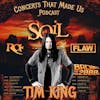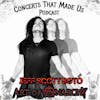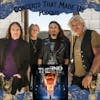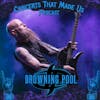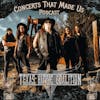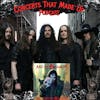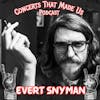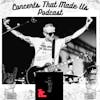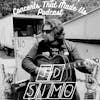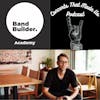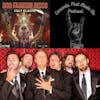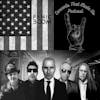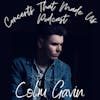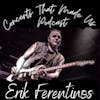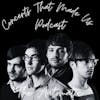Diving into the Depths of Swimmer's Musical Exploration

In this captivating podcast episode, Brian engages in a thought-provoking conversation with the exceptionally gifted musician, Swimmer, shedding light on the intricacies of his highly anticipated debut album, "Sirens and Cathedrals." With an air of excitement, Swimmer delves into the creative process behind the album, revealing that he single-handedly played all the instruments, showcasing his remarkable versatility and musical prowess.
As the interview unfolds, Swimmer passionately shares the arduous yet rewarding journey that led to the creation of "Sirens and Cathedrals." He opens up about his personal experience of rediscovering his love for the guitar and drums, which ultimately served as the driving force behind the album's conception. With each track, Swimmer's dedication and commitment to his craft shine through, as he meticulously crafted a collection of songs that encapsulate his artistic evolution.
Moreover, Swimmer delves into the collaborative aspect of his album, highlighting the diverse range of talented individuals he had the pleasure of working with. He reflects on the unique dynamics that each collaboration brought to the table, emphasizing how these interactions played a pivotal role in shaping the final outcome of his songs. It becomes evident that Swimmer's ability to adapt and embrace different perspectives has allowed his music to transcend boundaries, resulting in a truly captivating and dynamic album.
Beyond the music itself, Swimmer takes a moment to share his personal background and upbringing in the enigmatic Skeleton Coast. He recounts the transformative experiences he had while exploring the vastness of the desert, which served as a wellspring of inspiration for his creative process. Swimmer's connection to nature and the profound impact it has had on his music adds a layer of depth and authenticity to his artistry.
Throughout the interview, Swimmer's unwavering passion for his craft shines through, leaving no doubt about his dedication to making music leaving the audience eagerly anticipating the release of his debut album.
Find Swimmer here:
https://swimmer-music.bandcamp.com/
https://www.instagram.com/swimmer_music/
https://www.facebook.com/profile.php?id=100093376131126
https://www.youtube.com/channel/UCSbWCYq4Xv3qaM4p9JVLfaQ
Find CTMU here:
https://linktr.ee/Concertsthatmadeus
Newsletter: https://concertsthatmadeus.aweb.page/p/f065707b-2e34-4268-8e73-94f12bd2e938
If you would like to support the show you can do so by rating/reviewing us on Itunes and Spotify or by signing up at https://www.patreon.com/Concertsthatmadeus
Save 10% on Band Builder Academy membership by following this link https://bandbuilderacademy.com/Brian_Concerts/join and using promo code "concerts" at signup.
Become a member at https://plus.acast.com/s/concerts-that-made-us.
Hosted on Acast. See acast.com/privacy for more information.
Brian (00:00:00) - Swimmer. You're very welcome to concerts that made us.
Swimmer (00:00:04) - Hey, Brian. Thanks for having me.
Brian (00:00:06) - It's great to have you. Now, I'm looking forward to diving into your music over the next bit. So you're releasing your debut album, Sirens and Cathedrals on the 29th of September. What can you tell us about it?
Swimmer (00:00:21) - Well, I think the first thing to say is, is the name is derived from it being built up out of two halves or kind of two. Yeah, two halves, I guess in terms of the approach to and the nature of the music. I guess the first half is the more raucous or loud sounds and songs and then the second half is more the safe havens or the cathedrals part. So that's the first thing to say. But it all came together over the course of, I guess, three close to three years now. And it just started with me experimenting again because I have been making music over the course of my life from an early age, but decided to pick up the guitar again and start making just live music or instrumental music and moved away a bit from the from the electronic stuff and really started enjoying the songwriting process.
Swimmer (00:01:30) - So it's a culmination of three years of getting back into guitars. I've been playing drums also now for the greater part of 5 or 6 years and bringing that into the mix and seeing if I can do it all. That was the challenge because I wanted to see if I can take the songs, write the songs, and then basically take them to full fruition and, and effectively make make an album. And it was as it's a lot of work. That's the one thing I wanted to say is I never knew it was that that much work to to put an album together. But it's been an amazing adventure. And yeah, I'm very happy to say that. Now done and in the bag and ready to go. As you say, 29th of September. That's the launch date or drop date for it.
Brian (00:02:20) - I was actually going to ask or I was going to say you play all the instruments on the album. What was the journey like to become proficient in each one of them?
Swimmer (00:02:30) - Uh, frustrating, but also very rewarding.
Swimmer (00:02:35) - I had to play. I think what I realize is it's one thing to write a song. It's another thing to learn how to play that song and get to the nut of it or the the real essence of it and lay it down on a on a track. There's and I have a lot of respect for musicians that go into a studio and do it in 1 or 2 takes. I have the luxury, obviously, of using digital tools and being able to rerecord or do things again if they're not quite suited. And it took a while for me to get used to the recording process and not waste a lot of time. I think in the beginning I wasted a lot of time and just trying to get the songs to where they needed to be and in the process probably spoiled some songs and I had to discard some ideas along the way. But you are getting to play the songs once you've written it and you know you've got something and the structures there and the melodies there. And the next step is obviously starting to think about the parts, but I really enjoyed that.
Swimmer (00:03:42) - While it was frustrating, in one sense, it was super interesting and a voyage of discovery in a sense of getting to know the instruments. I mean, I really fell in love with bass, for instance, in the process. I just think it's such a subtle, subtle instrument. You could, you know, the first thought when thinking about the bass is that it's a like a blunt tool or a blunt instrument, but it's actually not. It's a very, very subtle and very intricate instrument, actually. And I really loved getting to know the bass, for instance, and my own voice. I think it was the first time in a long while that I've challenged myself to to lay down something proper in terms of vocal performance and getting to know, you know, the voice as an instrument is just unbelievable. I've discovered since that there's, you know, there's no doubt in my mind that the voice is the most complicated and complex instrument that you can get. And it's, you know, there's so many muscles and cavities in your head and your your, you know, that can resonate and help shape a sound.
Swimmer (00:04:50) - It's it's it's crazy. And you don't have control, you know, conscious control of a lot of those muscles. It's almost it becomes it has to be intuitive to a sense. So again that's that was something that was a big part of the adventures discovering these tools and including my own voice and, as I say, the instrumentation. So it's been awesome in that sense.
Brian (00:05:16) - Yeah, I can imagine. It sounds like a very enjoyable but as well when you're done a massive achievement, you know?
Swimmer (00:05:26) - Yeah, it is. But it's very true. What they say is that, you know, songs never and I believe it's with any piece of art, it's never really complete. You just have to decide when to put the tools down because you can spoil it and overbaked it. And like I said, there's some instances in their songs that there are songs that are in a folder somewhere in the archive folder that that fell by the wayside because I think I either overcomplicated it or overcooked it or overthought it.
Swimmer (00:05:57) - It's a very, very subtle exercise. And I think it's. It. You need to have a very finely tuned intuition around where the song is going, what's the nature of it, and when to let it go and when you've captured it and when to move on. So the whole process has been fascinating and and something that I'm really enjoying.
Brian (00:06:22) - Still love you to walk us through the recording process. How did you approach it? You know, once you had mastered each of the songs on the instruments, how did you actually sit down and go about recording it?
Swimmer (00:06:36) - Um, well, I guess each the origin of each of the song starts differently. Some of them started with a bassline. Some of them had a pretty defined chord structure already. I mean, one of the songs agency, actually the beat of agencies is, is a it's an odd meter, so it's to 7 to 7m. So that's been in my head for, geez, probably 15 years if not longer. So that that originated from that and wanting to do something with that and exploring how that would come into being the idea for something really big and on a grand scale in terms of agency.
Swimmer (00:07:27) - And what that beat could go to was always in in my mind. And so there it starts with the beat and then exploring what elements from a guitar and instrumentation perspective would sit with it. Other ones, like Feeding Time, started with a bass line, and I guess it often just starts with feel in laying down that initial four bar eight bar loop and seeing where it goes. But others and and many of the ones that that I've been having worked at for the past three and a half years were. A complete chord progressions, but not with an idea of how drums and other elements would come and complement that guitar part or those chord progressions. So it starts with a nugget or an initial thought and laying that down. And, and what I used initially was actually GarageBand and then and then, and I thought GarageBand was awesome just for getting an initial demo down and did that with most of the songs and then moved from GarageBand to Logic. And so and then, you know, just expanded the quality and improve the quality of the takes until I thought it was on a on a good enough level to have a producer take those takes and effectively just do a final mix of those takes.
Swimmer (00:08:54) - And it took a while to to also find the right person or persons to help me with. So with the tracks and the mixing. So again, just talking about agency, I found a guy here in Johannesburg called Craig Hawkins and he was really, really amazing and he knew exactly what to do with that track. The nature and the character of that track just suited his style of production. And and then there was another track called Walking on Home, and I looked for warmer, more retro kind of approach to to the mix. And I found another guy called Barry Burke. But then for the rest, I managed to find a guy in the Eastern Cape here in South Africa called Joe Ellis, and he helped me with with the rest of them and just nailing the rest of the of the album. Um, but yeah, it's that initial nugget is those tentative steps can be very nerve wracking because where you take it from there can really again make or break the track or really define it in terms of where it needs to go.
Swimmer (00:10:02) - It's kind of interesting to to look at the tracks now and I'm playing the tracks live now, obviously, and exploring them. And it's now that I'm finding that they're actually maturing and I'm hearing things in the in the way I'm playing them live now that that's actually educating me on, on the, the real nature of the songs and where they sit on a more accurate place, emotionally, arrangement wise, etcetera. So I don't think the songs are ever done, like I said. And I think even playing them live, they change, they changes you. You keep playing them.
Brian (00:10:43) - I'd love to dive into your history for a bit now because I feel like it's interlinked. Obviously with the album, which are sound and with the inspiration. First off, you're from the Skeleton Coast. I've heard it's called The Place God Made in Anger. For those of us that don't know. Can you paint a picture of it?
Swimmer (00:11:05) - Well, I mean, the first thing to say, obviously being the Skeleton Coast is that it's it's where the the cold Atlantic meets the the Namibian desert.
Swimmer (00:11:15) - So you've got these two extremes. And within that, people have been managed, managed to make a living for hundreds of years obviously through diamonds and and other industries fishing. There's not much there's literally a desert on the one side and an ocean the other, I suppose the oceans where the food and, you know, most of the sustenance comes from. The desert itself is amazing. And I, I mean, I love driving through the desert and spending hours in that landscape. I think it rearranges your synapses in a sense. It really reconfigures the way you see the world, or it just puts you in another mind space. So, um, but it's there are some, you know, the towns are small towns, like literate are interesting. And, you know, it's almost like a land that, like you say, either God made an angle or that God forgot. But there is life there definitely between those dunes and their stories there. So it's a fascinating landscape and one that has a presence, a definite presence.
Brian (00:12:31) - Yeah, I totally get what you're saying about the desert years and years ago, actually. I managed to go into the Sahara Desert on a holiday for a couple of days, and no, it was very touristy, but just the landscape. I totally get what you say. What you mean when you say it does something to you. You know, it really touches you deep inside and kind of changes how you think. But you led somewhat of a nomadic existence from an early age. What was what was that period like in your life?
Swimmer (00:13:06) - Yeah, I think moved 14 years. 14 times in 11 years. So you just got used to backing things up and moving along and that gave me an opportunity to also get to know other parts and and different people. And I think it also it kind of informs the way you see the world and look at the way you become an observer. You become almost someone that looks at things often on the side or the fringes of things. And I've always been comfortable in occupying that space.
Swimmer (00:13:48) - For me, it's always been interesting in observing people's behaviors, events and and so from that point of view, being a bit of a voyeur, it helps with your imagination and storytelling and, and moving along the fringes, as I say.
Brian (00:14:05) - Where does music come into this then, this nomadic lifestyle, and how did you discover music or can you remember, say, your earliest musical memory?
Swimmer (00:14:16) - Yeah, the I would say. The there were some some Reader's Digest tapes actually, that I used to listen to quite a lot. And they had these beautiful and some would say very cheesy songs from the 1950s, 40s and but beautiful, sweetly constructed songs that kind of stuck in the memory for me in terms of what those songs meant. I mean, we listen to it a lot as a young, as a young boy. So that's the first memory, actually. And then obviously later on, when you in your teen years, you get exposed to to other things. And having been in the 90s in my teens, it moves on to the likes of, you know, Bill Jam.
Swimmer (00:15:17) - Soundgarden was a big one for me, a big discovery Stone Temple pilots, but also Discovery. Discovering those songwriters, early songwriters was also important for me, a big album for me that really changed the way I thought about music and making and composing music and really made me sit upright was was things ten Summoner's Tales. That album had a lot of odd meters and like some amazing jazz musicians on it. And I just I still listen to that album often. I think it's an amazing album from a songwriting and composition perspective. Yeah. So those were the early influences. As I mentioned, grunge played a big role, but then electronic music kicked in. In the late 90s, the likes of Ninja Tunes Trip Up and Jungle. I thought it was amazing when I heard Jungle the first time, I thought, This is the most incredible thing I've ever heard in my life. So it was a real shock to the system when electronic music first hit ambient stuff, all the Cray, you know, the usual suspects, Aphex Twin Pusher, all those guys.
Swimmer (00:16:41) - I really went into electronic music and kind of, I guess, put the guitar aside for a bit. Pistol played every now and again, but didn't do any serious songwriting for a while. But yeah, I guess as you get older, your your tastes developed as well now. I mean, jazz was obviously from the from that early, from the early days also in the 90s discovered jazz and all sorts of jazz influences from the usual. Miles Davis, Chet Baker. I played trumpet also for. But I was a big fan of that. The jazz trumpet players, horn players and then, you know, people like Fela Kuti. I fell in love with African jazz and African musicians. Louis McClung. Sure. So many all over the country, you can go on and on. So all of that became a mix and melting pot, I guess, in terms of sounds and things that I'm into. I'm still a big jazz fan. I love fusion. I still love the good songwriters in the world.
Swimmer (00:17:58) - Sting obviously being one of them, but I mean, big fan of Rufus Wainwright, also Bruce Springsteen. Obviously there's a whole host one can go on and on.
Brian (00:18:11) - It's massively eclectic taste there.
Swimmer (00:18:15) - Yeah, I should mention actually, Tom Waits also Tom Waits had a very, very big influence on me and a big impact on me. The first time I heard Tom Waits is just one. Also one of those moments where you go, what is this? This is amazing. And he's he's been a big part of. Um. You know, I would even say my identity or my, you know. My view of my world view even. I just love the guy. I love his imagination, his approach to things, his childlike curiosity. And it's evident in his music. His music can sound dark, but I think his music is just so full of a celebration of being human and being messy. And I love the dude.
Brian (00:19:00) - Yeah, he's a great one. There's a reason why he's held in such high regard, I suppose.
Brian (00:19:05) - And you know your own decision to become a songwriter then. It stems from a psychedelic pilgrimage in the desert. We've got to hear whatever you can tell us about that.
Swimmer (00:19:20) - Yeah, I mean, it was. It was. It was a strange moment in time. I don't like being there in the desert obviously has its own effect on your psyche and your consciousness. You know, just being placed, located in that, in that vast expanse and that in that space. And obviously during one of my pilgrimages up and down the coast, I ended up on the dune somewhere and lost track of time for, you know, for, for what it's worth, and then had an encounter or some some kind of engagement with, I suppose, a voice or something that tells you or shows you the way. It's, it's difficult to put it into too much detail. And sounds can sound corny, but that was a watershed moment, I guess something that put you on the track to to starting to explore something and maybe a voice, as I said, or a hand showing you the way.
Swimmer (00:20:31) - So, so I don't want to make too much of it, But it was it was a seminal moment in terms of just understanding where the, you know, what the pursuit needs to be.
Brian (00:20:44) - Gotcha. Gotcha. And, you know, at this stage in your career, then, what's your views on the music industry as someone trying to kind of break into us or get more recognition?
Swimmer (00:20:57) - Um. Well, I mean, for me. The notion of a music industry is an interesting one. I. I think the first the first thing to say is that I'm doing what I'm doing because there's something that needs to be expressed or I feel like this is something I want to explore. And the process of packaging it and getting it out there into. The hands of an audience has been also an interesting one and one that I haven't that I didn't think of until it became a real, real thing. So I think for a long time it was just about making the, the music and, and wanting to obviously perform it live, which is what I'm doing now.
Swimmer (00:21:48) - And I'm really pursuing that, which is giving me a lot of reward and enjoyment is just playing it. But so, so the music industry itself I think is very fractured. And from the outside in, I'm not talking about or talking from a point of view from of someone that's been there for a while. So, I mean, again, just having gone through this experience of having made a debut album and getting it out there, I have a lot of respect for people that have done the hard yards and I've been doing this for years and decades even, and playing the circuit and recording the songs and making the songs and getting and trying to get in front of an audience. You do? I mean, for me, you do want to, at least from my point of view, you want to make these songs to get them to people, to play them and and get them out there. Otherwise I would have been content just, you know, making it for my own sake and filing it somewhere.
Swimmer (00:22:50) - But for me, it's it's been and I think it was a key decision at some point to make is to say, well, am I doing this to just for myself? Why am I doing this to actually get it out in the world? And the answer was yes. Both both of those things. Um, so getting it out into the world has been an interesting one. Getting it onto streaming platforms and talking to people like yourself and getting getting people's eyes and ears attuned to it or getting it noticed. It's an interesting process for me. Um. For me, it's about playing it live and and building an audience that way. And I think that's always been the case. I think historically, if you look at music, that's where you need to start and that's where you hone your craft. And again, as I said earlier, that's where the songs come to life and mature and breathe and and find and the rest in terms of promotional activity. And as I say, talking to people like you, that's I guess that's pointing that's part of the exercise and pointing to the music.
Swimmer (00:24:05) - But I'd be glad if I could, from here on out make more because I certainly want to make more music and there's a lot more ideas that I want to lay down. So I'm really starting to think about next what the next collection could include and what. And there's a few more songs that I've been working on since then and getting it in front of people. So from an industry perspective and monetization, I mean, to be honest with you. That's very far from from any consideration at this point. But of course, you want an audience. And what I'm hoping is that with, you know, working on your craft and being dedicated to committed to making the songs come to life and and and come to fruition will you know, will do that.
Brian (00:24:53) - Definitely. Definitely. And speaking of audiences, it is called concerts that made us, after all. So I have to ask you, as a concert goer, what concerts have made you?
Swimmer (00:25:06) - Yes. I mean, maybe the first concert to mention was concert at the Standard Bank Arena in Johannesburg, and that was OMD and Mango Groove.
Swimmer (00:25:17) - That was the first one that I saw on such a big scale. And I thought that was amazing. Really? I guess as a young, very impressionable person, that there was something big to see and these big acts and all those people on stage doing what they do. But if I talk about concerts are really formative for me in terms of a musician. I'll have to say that those those gigs, especially in the 90s, I was fortunate to, to see gigs in Johannesburg at the baseline when it was still in in Melville. And Abdullah Ibrahim was there again. I was there. Louis McClung was there. I think Oliver, Texas was also there at one stage. Those those those musicians were real. You know, a real artist, real craftsman and, you know, at the top of their game. So seeing them there and the baseline was a very, very special place. At the same time, you had the rock and rock scene and going on and to that extent. Seeing the Springbok nude girls.
Swimmer (00:26:41) - And I saw them a couple of times. But there was a this was a club in Johannesburg called the Roxy. Um, and I saw them there a couple of times, even stage dived a couple of times during that gig. Um, that was an awesome gig. And I remember at 3:00 in the morning looking for car keys, I just couldn't find it. Literally being the last person in the club and the cleaners sweeping the floor with just the debris of of the evening. This is heap of dust and trash and whatever else. And on this heap of trash was my car keys and basically just walked up to to this heap of trash. They took my car keys and went home. But it was it was an amazing evening. And there were many of these with the need good gig gigs. There's another venue called Wings Beat Bar in Braamfontein. And that was again, thin like this, this very narrow, narrow, long venue that you would imagine even being in New York someplace and just a brilliant venue for live music.
Swimmer (00:27:50) - Um, so yeah, in terms of local performances, that was, that's probably one of the earliest ones that really had a big impact on me. One that really stands out for me was seeing David Kramer at O.P. Copy. I think it was 98. I was by then, I was already kind of I've got a job as a designer and a digital agency. And I was I got the camera stuffed in my hand and and got told that I got to press pass so I can really go anywhere and take pictures with the purpose of using it on the website. And I made full use of that. I went around taking a lot of pictures, but I was fortunate enough to see David Kramer perform there, and that evening was just unbelievable. There was a real sense of magic happening there, and it was his first time playing. I think he was apprehensive because he wasn't sure how the crowd was going to take him or receive him, and they just received him with open arms. I mean, that crowd at times was it was just magical to be part of it and really made a big mark on me seeing seeing that performance also that same that same festival with nanas, with guitar, you know, Tony Cox and Ian Herman.
Swimmer (00:29:24) - Amazing. Just the Sunset Sunset gig that they did. Yeah. And then later on, I guess as I got older, I had the opportunity to see more and more bands. I was fortunate enough to see Rufus Wainwright in London as well. But the big one, that big international one that I thought. Just I was incomplete or I was Bruce Springsteen. I can't remember what year he was. He performed I think was may have been in the 20 tens, but it was like seeing Elvis. I was it was unbelievable. And he went he kept going for three hours. I don't know how he did it. I think he was there already in his late 60s or 70s, and he just kept going. And I mean, that guy is a force of nature. It was just it was a religious experience. And yeah, so, I mean, those I guess just some of the. The you know, some of the ones that stick out for me.
Brian (00:30:37) - Oh, man. If that's just some of the ones you need to write a book on a concert you've been to, that sounds.
Brian (00:30:44) - I'm hugely jealous, I have to say.
Swimmer (00:30:48) - Well, there's still some that I'd like to see. I mean, there's so many amazing musicians and bands and outfits out there. The one band that I'd love to see is is Radiohead. I just think they, you know, the absolute magicians. They they geniuses. I've watched a few live concerts online during Covid. They made a few available on YouTube. And I think I watched the Berlin one and it was just unbelievable to see how they combined live instrumentation with the electronic instruments and the mastery that they have. Of those instruments. I remember seeing a documentary or the of Pink Floyd and and it took them, I think, according to the documentary, about two years to master all the instrumentation, to get that sound, to get it all working properly live. And I remember thinking about that when I saw Radiohead and thinking, well, these guys are, you know, modern Pink Floyd. They in terms of the mastery of the instruments and the complexity of what they put together, it's just on another level, it's hard to fathom.
Swimmer (00:31:58) - You look at it and you go, there is no way that, you know, can be created live. But they're doing it. They're doing it live and they using no backtracks or anything like that. They you know, it's it's just jaw dropping to see.
Brian (00:32:12) - Yeah. Yeah. It really is really is And you know, we have to move on to your gigs now for any listeners that haven't got one of your shows, what can they expect? Lay it all out for them if you can.
Swimmer (00:32:27) - Well, in terms of the mix of songs, I think again, as the album and the album name alludes to, it's a there's some real toe tappers where there's 1 or 2 toe tappers, there's there's some really hard ones also, and there's and there's a few that are more contemplative and, and acoustic in terms of the gigs themselves. It's exactly that. It's a mix of, of those I am building on a, on a set that will include a lot bigger, bigger sound. For the moment, the gigs and the type of venues I'm playing is it doesn't always allow for, you know, full electronic or electric set with, with, with all the distortion and, and noise that goes with it.
Swimmer (00:33:21) - So, you know, the songs themselves lend them to being played in intimate venues and also, you know, with, with the addition of some additional instrumentation and players they can they can be really get really big as well. So yeah any any set is is a mixture of I guess the the more upbeat uptempo ones and the ones in the as I said in the first half of the album is probably the ones that are or lend themselves to to, to making a bit of noise. And then I like to mix that up with a with a more contemplative songs, the, you know, the more intimate sounds and, and acoustic numbers as well.
Brian (00:34:16) - Sounds like quite the experience. And, you know, out of all the gigs you've played, then, is there one that sticks in your mind as maybe the best you've played or the best experience you've had?
Swimmer (00:34:30) - Well, it's early days. I mean, I'll be honest, I don't have a I don't have a years and years of many gigs under the belt.
Swimmer (00:34:39) - So I'm hoping that those stories are still going to come. And I'm keen to to play more venues played at the radium that was there was earlier this year. I love that venue. So that was special. That's one of the oldest, if not the oldest pub in in Johannesburg. A lot of journalists hang out there and used to hang out there. Interesting memorabilia on the walls, a real institution in Johannesburg. And many bands have played there. So it was really special to just do a do a set there. And then you know this on the 30th playing at a festival in details still need to be better done. So I'm looking forward to that. But I would say the radium was, for me, a special set.
Brian (00:35:33) - Rice. Rice like us. Like us. And, you know, when it comes to short time, then just before you go on stage, how do you psych yourself up? And then afterwards, how do you wind down?
Swimmer (00:35:47) - Well, the one thing that I've learnt is not to have too many beers or other things before the before the set, because that can that can be detrimental to a good performance.
Swimmer (00:35:59) - But I think for me, it's just it's finding some quiet space and finding some. I don't get too hyped up, to be honest with you. I don't get too psyched up. It's more about, I think when you're playing music, you got to you got to be in some kind of balanced or quiet space to to be able to even when you're doing loud stuff and even when you're playing, you know, the large numbers you need to be in a space of control and in focus. So yeah, before a gig, usually just maybe half an hour before, try to find a space to mentally prepare or work through the songs in my head. Warm up a little bit and, and then and you know, usually when it's show time, there's always a bit of nervous jitters before. But once you get onto the stage, I mean, I love just playing with people, playing with fellow musicians and performing the songs. And I think most of that just kind of dissipates. But. Yeah, it's mostly just getting to that quiet place and a place of focus in your mind before you before you get onto stage.
Brian (00:37:21) - Nice, right? And, you know, say you play the best gig of your life. You wake up the next morning, it's back to normality. What sort of effect does that have on you and how do you deal with it?
Swimmer (00:37:37) - Well, I think and, you know, just just from playing also over the years in different. With different people. And the immediate effect of coming off a stage when you've just performed, especially if it's been a high energy gig and, you know, giving it your all. It's difficult to wind down. It's difficult to just get all the levels of adrenaline to a point where you can actually sleep. So the very that night or the rest of the evening, it's. Playing. Playing live really energizes you. I think there's a lot that. Lot going on after coming off a stage and then trying to sleep, then it's usually a bit of a problem. Yeah, can be. And then, yeah, there's definitely a bit of a comedown, especially once you.
Swimmer (00:38:39) - Back to normality, as you say, back to to everyday life. And so there's there's something to be said about being just being conscious of it and and trying to stick to your routine and seeing it as a craft. The live performance stage is the magical pardon. You work towards that. But it's it is in a sense, keeping the discipline of once you are off the stage or waiting for the next one not to get despondent, but to keep going at it. And you know, playing music, there's so much you can still improve on and work on that it's, you know, in a way it's not getting distracted and and keeping your head down and and making sure that you're working on that craft. And that's the stuff that fuels you, again, keeps you going and keeps you inspired for the next gig. So, yeah, the gigs themselves can be a bit of a drug or a addiction. And it can have very high highs. It can be it can also, you know, gigs aren't always perfect.
Swimmer (00:39:53) - They can also be, in a way, debilitating or disparaging, if at all, if it goes wrong. And I'm I tend to be quite hard on myself in terms of the the gigs themselves and the performance if it's not going well, you know, I'm more mindful of the things that that can be improved upon than necessarily, you know, what went well. So I think there's for me always things to work on afterwards and keep improving on for the next gig. So yeah, I think it's just keeping your head down and keeping working and seeing it as a craft and working away at it.
Brian (00:40:31) - I like it. I like it. And you know, when it comes to your personal life, then how do you find the balance between that and the demands of being a musician?
Swimmer (00:40:43) - Yeah. I mean, one of my friends, a good friend of mine said that and he's also a musician said, you know, when you're in the studio, you invariably you if you have a girlfriend or a partner, they become a studio widow because you spend a lot of time in the studio, especially if you're recording and making a new album.
Swimmer (00:41:04) - And to an extent, I'm I am relieved that that the recording part for now is, is kind of set aside and I can just work on my live act and but that also takes practice. So again it's it's but it's something I choose you know it's not it's not a it's not a burden I choose to to play music and and that's the, the food and the sustenance that I have from a creative perspective keeping that going. And, and so from a hobby probably perspective that I think you know music is is it for me that the health and especially physical health I mean you can you can potentially and what I find is that once you once you're in the studio or you busy with something, you can easily spend 2 or 3 hours there and not notice time go by. So one has to be mindful of going outside, taking a break, taking a walk or going for a jog and and keeping that balance going. I have found that, you know, at times music encroaches sometimes on your focus.
Swimmer (00:42:17) - You know, like you say, there is still reality. And, you know, I'm not a full time professional at the moment. I'm still I'm still keeping the paying the rent by being a designer and being in the design profession. So so to that degree, it's it's making sure that, you know, it's hard to keep the world separate sometimes. And a song idea can come up at any time. Also, I find that waking up at 3:00 in the morning with the song in my head happens, I would say about once a month.
Brian (00:42:57) - Right?
Swimmer (00:42:57) - And then it's about finding the guitar or, or whispering into your phone like a ridiculous person at 3 a.m. in the morning and not waking your partner. That's those are part of the challenges.
Brian (00:43:11) - Yeah. Yeah.
Brian (00:43:13) - And if we look ahead, then. And you think about your career, how would you like to evolve? You know, what would your music be like and say, five years time.
Swimmer (00:43:26) - Yo, there's so much I still want to explore, as I said.
Swimmer (00:43:31) - Um. Yeah, I want to get more intricate or nuanced with the I want to get better at composition and instrumentation. I want to explore other elements. You know, this this album I'm very happy with. It's got a very strong rock foundation, I guess, in terms of where it started and its intent. But there are elements there that I want to expand on the elements of soul and funk, and I've always been a big fan of funk. I mentioned Fela Kuti and James Brown and those those people that are those musicians at a big influence on me. So there's some elements I want to explore. I have been and, you know, I was busy with a lot of electronic stuff in the past and I want to bring elements of that into it. I want to get better at vocals and vocal vocal harmony. So it's there's so much. Uh, and in bringing those things together and fusing elements of funk and electronic and rock together, I think that's, you know, that's, that's kind of in the back of my mind where I want to go next and obviously just get better at songwriting.
Brian (00:44:49) - Sounds like it would be very challenging, but very enjoyable as well.
Swimmer (00:44:55) - Yeah, I'm sure there's going to be frustrating moments and and learnings from it. But I mean that's the whole thing is is with something like this is you you keep exploring and you do it because you want to know you're curious, you're curious about where things can go and to to an extent you have to be willing to throw yourself in it and and see what comes out. You don't you don't know always And that's that's the cool part of it. So yeah, I'm very keen and, and and doing a second album and, and getting a new direction going. As I said, there's lots of stuff out there and you know, music is a is a very very big universe with lots of different influences and people doing amazing things. So who knows? Who knows where it's going next?
Brian (00:45:49) - That's for sure. That's for sure. And before we dive into the last couple of questions, then, what's the rest of the year look like? Is there anything you want to tell us about besides the album coming out?
Swimmer (00:46:02) - Yeah.
Swimmer (00:46:03) - So at the moment I'm, I had a I a live performance recently on the 18th of, of August with, with two friends of mine, Jerome may not on drums. He was formerly from nine amazing drummer and also just generally amazing person and then the bassist Keith Henderson. Keith's unfortunately is moving to Cape Town now, so he's abandoning me for greener pastures in Cape Town. And so I'm looking to to just get the the the live band in a good place again. And then there's a there's a festival, a small acoustic festival in Lisbon. I mentioned the details still just confirming with the with the organizers over the course of the next two weeks and that's happening on the 29th and 30th. And then looking to to get looking to get just a few gigs going in and around Joburg. But at the moment. This, this. There's not a set itinerary or set of events in the foreseeable future. So we keep playing on at local, at local venues in London. On Saturdays there's a place called the Rustic Vine.
Swimmer (00:47:25) - So I'm usually there on Saturdays, and then there's just the usual live regular life set ups on a monthly basis, and they have a collection of musicians and solo artists doing their thing there. They're busy. They're also on a regular basis. But yeah, as I said, the bigger sound, the bigger set up, that's that's what I'm aiming to, to, to get going in the next couple of months and see what I can that, that can take me in terms of venues and audiences. And so there's, there's, there's a bit of work to be done there and I'm aiming to to get that going. As I said before, the years are to get a few nice, nice venues, nice big gigs under the belt.
Brian (00:48:16) - Brilliant. Well hopefully it all comes together anyway and we'll dive into the last couple. So these are a couple of odd phone music questions, but I'm intrigued to see your answers. If you could see any performer from history in concert for one night only, who would it be?
Swimmer (00:48:35) - Wow.
Swimmer (00:48:41) - Sure. I'd love to have seen Fela Kuti. I was in Nigeria, I was there actually doing some work. And then I and it was at the same time as Filtration Week, which is an amazing week of just Nigerian artists. And also Femi Kuti played at the shrine, not the original shrine, but I think it was the second club. So I managed to go to the shrine and see Femi Kuti play, but I'd love to have seen his father play. I think that would have been amazing. And then. Yeah, I guess. Soundgarden I kind of missed that one. Soundgarden was also a big influence on me, so. But sure, there are so many different musicians from the past that would have been amazing to see from the 70s onwards. One can go on and on. I mean, but let's just stop at those two, maybe.
Brian (00:49:52) - Two very good choices. And here's where the odd part comes in. Now, if you had to spend 24 hours locked in a room with any musician from history, who would it be?
Brian (00:50:05) - Sure.
Brian (00:50:08) - Um.
Swimmer (00:50:09) - I don't know if it's healthy to be stuck in a room with a musician for 24 hours.
Brian (00:50:14) - Probably not.
Swimmer (00:50:16) - We probably drive each other crazy.
Swimmer (00:50:23) - Wow. Uh, sure.
Swimmer (00:50:30) - Again, there's so many, I think. Tom Waits, probably because he has tons of stories. He'll probably keep you entertained.
Brian (00:50:40) - I was half expecting to answer now, I must say.
Brian (00:50:44) - Yeah. Yeah.
Brian (00:50:46) - Good one for.
Brian (00:50:47) - Sure.
Brian (00:50:48) - And the final one. So I've been told this is near impossible to answer. What song would appear on the soundtrack to your life?
Swimmer (00:50:59) - Uh, geez.
Swimmer (00:51:06) - Yeah, that's again, that's, you know, that is almost impossible. But if I have to say one, one song then. It will probably be.
Brian (00:51:22) - Uh, amen.
Swimmer (00:51:25) - Lou Reed's Walk on the Wild Side.
Brian (00:51:27) - Like it like is perfect choice. Listen, I've really enjoyed chatting with you, and it's been an absolute blast.
Swimmer (00:51:34) - Thank you, Brian. Thanks for the time. And I enjoyed talking to you, too.
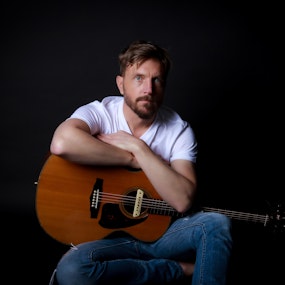
Swimmer
Raised in place that time forgot, Swimmer is a windswept troubadour from the Skeleton Coast whose timeless songs have careened their way across the desert.
Featured Episodes
Here are some great episodes to get started with


















